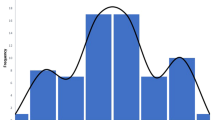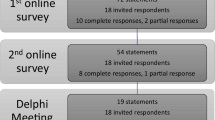Abstract
Crowdsourcing from the general population is an efficient, inexpensive method of surgical performance evaluation. In this study, we compared the discriminatory ability of experts and crowdsourced evaluators (the Crowd) to detect differences in robotic automated performance metrics (APMs). APMs (instrument motion tracking and events data directly from the robot system) of anterior vesico-urethral anastomoses (VUAs) of robotic radical prostatectomies were captured by the dVLogger (Intuitive Surgical). Crowdsourced evaluators and four expert surgeons evaluated video footage using the Global Evaluative Assessment of Robotic Skills (GEARS) (individual domains and total score). Cases were then stratified into performance groups (high versus low quality) for each evaluator based on GEARS. APMs from each group were compared using the Mann–Whitney U test. 25 VUAs performed by 11 surgeons were evaluated. The Crowd displayed moderate correlation with averaged expert scores for all GEARS domains (r > 0.58, p < 0.01). Bland–Altman analysis showed a narrower total GEARS score distribution by the Crowd compared to experts. APMs compared amongst performance groups for each evaluator showed that through GEARS scoring, the most common differentiated metric by evaluators was the velocity of the dominant instrument arm. The Crowd outperformed two out of four expert evaluators by discriminating differences in three APMs using total GEARS scores. The Crowd assigns a narrower range of GEARS scores compared to experts but maintains overall agreement with experts. The discriminatory ability of the Crowd at discerning differences in robotic movements (via APMs) through GEARS scoring is quite refined, rivaling that of expert evaluators.


Similar content being viewed by others

References
Lanfranco AR, Castellanos AE, Desai JP, Meyers WC (2004) Robotic surgery. Ann Surg 239(1):14–21. https://doi.org/10.1097/01.sla.0000103020.19595.7d
Birkmeyer JD, Finks JF, O’Reilly A et al (2013) Surgical skill and complication rates after bariatric surgery. N Engl J Med 369(15):1434–1442. https://doi.org/10.1056/NEJMsa1300625
Reznick R, MacRae H (2006) Teaching surgical skills—changes in the wind. N Engl J Med 355(25):2664–2669. https://doi.org/10.1021/jf052913o
Hogle NJ, Liu Y, Ogden RT, Fowler DL (2014) Evaluation of surgical fellows’ laparoscopic performance using Global Operative Assessment of Laparoscopic Skills (GOALS). Surg Endosc Other Interv Tech 28(4):1284–1290. https://doi.org/10.1007/s00464-013-3324-6
Aghazadeh MA, Jayaratna IS, Hung AJ et al (2015) External validation of Global Evaluative Assessment of Robotic Skills (GEARS). Surg Endosc Other Interv Tech 29(11):3261–3266. https://doi.org/10.1007/s00464-015-4070-8
Moorthy K, Munz Y (2003) Objective assessment of technical skills in surgery. Br Med J 327(7422):1032–1037. https://doi.org/10.1136/bmj.327.7422.1032
Darzi A, Smith S, Taffinder N (1999) Assessing operative skill: Needs to become more objective. Bmj 318:887–888. https://doi.org/10.1136/bmj.318.7188.887
Buhrmester M, Kwang T, Gosling SD (2011) Amazon’ s mechanical turk: a new source of inexpensive, yet high-quality, data ? Perspect Psychol Sci 6(1):3–5. https://doi.org/10.1177/1745691610393980
Vernez SL, Huynh V, Osann K, Okhunov Z, Landman J, Clayman RV (2017) C-SATS: assessing surgical skills among urology residency applicants. J Endourol 31(S1):S-95–S-100. https://doi.org/10.1089/end.2016.0569
Ghani KR, Miller DC, Linsell S et al (2016) Measuring to improve: peer and crowd-sourced assessments of technical skill with robot-assisted radical prostatectomy. Eur Urol 69(4):547–550. https://doi.org/10.1016/j.eururo.2015.11.028
Lendvay TS, White L, Kowalewski T (2015) Crowdsourcing to assess surgical skill. JAMA Surg 150(11):1086–1087. https://doi.org/10.1001/jamasurg.2015.2405
Wang X, Mudie L, Brady CJ (2016) Crowdsourcing: an overview and applications to ophthalmology. Curr Opin Ophthalmol 27(3):256–261. https://doi.org/10.1097/ICU.0000000000000251
Mitry D, Peto T, Hayat S, Blows P, Morgan J, Khaw K-T et al (2015) Crowdsourcing as a screening tool to detect clinical features of glaucomatous optic neuropathy from digital photography. PLoS One 10(2):e0117401. https://doi.org/10.1371/journal.pone.0117401
Liebeskind DS (2016) Crowdsourcing precision cerebrovascular health: imaging and cloud seeding a Million Brains Initiative™. Front Med 3:62. https://doi.org/10.3389/fmed.2016.00062
Mavandadi S, Dimitrov S, Feng S, Yu F, Sikora U, Yaglidere O et al (2012) Distributed medical image analysis and diagnosis through crowd-sourced games: a malaria case study. PLoS One 7(5):e37245. https://doi.org/10.1371/journal.pone.0037245
Holst D, Kowalewski TM, White LW et al (2014) Crowd-sourced assessment of technical skills: an adjunct to urology resident surgical simulation training. J Endourol 29(5):604–609. https://doi.org/10.1089/end.2014.0616
Chen C, White L, Kowalewski T et al (2014) Crowd-sourced assessment of technical skills: a novel method to evaluate surgical performance. J Surg Res 187(1):65–71. https://doi.org/10.1016/j.jss.2013.09.024
Powers MK, Boonjindasup A, Pinsky M et al (2016) Crowdsourcing assessment of surgeon dissection of renal artery and vein during robotic partial nephrectomy: a novel approach for quantitative assessment of surgical performance. J Endourol 30(4):447–452. https://doi.org/10.1089/end.2015.0665
Aghdasi N, Bly R, White LW, Hannaford B, Moe K, Lendvay TS (2015) Crowd-sourced assessment of surgical skills in cricothyrotomy procedure. J Surg Res 196(2):302–306. https://doi.org/10.1016/j.jss.2015.03.018
Ghani KR, Comstock B, Miller DC et al (2017) Technical skill assessment of surgeons performing robot-assisted radical prostatectomy: relationship between crowdsourced review and patient outcomes. J Urol 197(4):e609. https://doi.org/10.1016/j.juro.2017.02.3221
Polin MR, Siddiqui NY, Comstock BA et al (2016) Crowdsourcing: a valid alternative to expert evaluation of robotic surgery skills. Am J Obstet Gynecol 215(5):644.e1–644.e7. https://doi.org/10.1016/j.ajog.2016.06.033
White LW, Kowalewski TM, Dockter RL, Comstock B, Hannaford B, Lendvay TS (2015) Crowd-sourced assessment of technical skill: a valid method for discriminating basic robotic surgery skills. J Endourol 29(11):1295–1301. https://doi.org/10.1089/end.2015.0191
Hung AJ, Chen J, Jarc A, Hatcher D, Djaladat H, Gill IS (2017) Development and validation of objective performance metrics for robot-assisted radical prostatectomy—a pilot study. J Urol 199(1):296–304. https://doi.org/10.1016/j.juro.2017.07.081
Goh AC, Goldfarb DW, Sander JC, Miles BJ, Dunkin BJ (2012) Global evaluative assessment of robotic skills: validation of a clinical assessment tool to measure robotic surgical skills. J Urol 187(1):247–252. https://doi.org/10.1016/j.juro.2011.09.032
Katz AJ (2016) The role of crowdsourcing in assessing surgical skills. Surg Laparosc Endosc Percutan Tech 26(4):271–277. https://doi.org/10.1097/SLE.0000000000000293
Gomez ED, Aggarwal R, McMahan W, Bark K, Kuchenbecker KJ (2016) Objective assessment of robotic surgical skill using instrument contact vibrations. Surg Endosc Other Interv Tech 30(4):1419–1431. https://doi.org/10.1007/s00464-015-4346-z
Dubin AK, Smith R, Julian D, Tanaka A, Mattingly P (2017) A comparison of robotic simulation performance on basic virtual reality skills: simulator subjective versus objective assessment tools. J Minim Invasive Gynecol. https://doi.org/10.1016/j.jmig.2017.07.019
Holst D, Kowalewski TM, White LW et al (2015) Crowd-sourced assessment of technical skills: differentiating animate surgical skill through the wisdom of crowds. J Endourol 29(10):1183–1188. https://doi.org/10.1089/end.2015.0104
Raza SJ, Field E, Jay C et al (2015) Surgical competency for urethrovesical anastomosis during robot-assisted radical prostatectomy: development and validation of the robotic anastomosis competency evaluation. Urology 85(1):27–32. https://doi.org/10.1016/j.urology.2014.09.017
Acknowledgements
Anthony Jarc and Liheng Guo at Intuitive Surgical for providing and assisting with dVLoggers.
Author information
Authors and Affiliations
Contributions
PJO: data management, data analysis, and manuscript writing. JC: project development, data collection, and manuscript editing. DH: data collection. HD: data collection and manuscript editing. AJH: project development, data collection, and manuscript editing.
Corresponding author
Ethics declarations
Conflict of interest
Paul J. Oh B.S. declares no conflict of interest. Jian Chen M.D. declares no conflict of interest. David Hatcher M.D. declares no conflict of interest. Hooman Djaladat M.D. declares no conflict of interest. Andrew J. Hung is a consultant for Ethicon, Inc., and receives clinical research funding from Intuitive Surgical.
Ethical standards
Ethical research standards were met, and informed consent was obtained from all individual participants included in the study.
Electronic supplementary material
Below is the link to the electronic supplementary material.
Rights and permissions
About this article
Cite this article
Oh, P.J., Chen, J., Hatcher, D. et al. Crowdsourced versus expert evaluations of the vesico-urethral anastomosis in the robotic radical prostatectomy: is one superior at discriminating differences in automated performance metrics?. J Robotic Surg 12, 705–711 (2018). https://doi.org/10.1007/s11701-018-0814-5
Received:
Accepted:
Published:
Issue Date:
DOI: https://doi.org/10.1007/s11701-018-0814-5



